On May 18, the party of Argentine President Javier Milei won the Buenos Aires city council elections, an indication that the libertarian politician maintains a mandate to continue his radical economic reforms. However, Argentine society is divided on the impact of his rule, which has caused a spike in poverty rates and led to the rampant price growth of consumer goods. Increasing numbers of people are becoming homeless, but despite the promised efficiency of the austerity regime, an end to the protracted economic crisis is nowhere in sight. Argentine citizens and economists interviewed by The Insider note that Milei’s campaign promises have yet to be fulfilled. Meanwhile, the country has seen a crackdown on the free press, and Milei’s ‘chainsaw’ cuts are also targeting science, education, and even cinema.
Libertarian Javier Milei won the 2023 presidential election with the promise to “make Argentina great again.” His young party, La Libertad Avanza (Freedom Advances), was founded in 2021. On May 18, it took first place in elections to the Buenos Aires city legislature, winning 30.13% of the vote.
Meanwhile, the center-right PRO party, which had governed the Argentine capital for 18 years, slipped to third place, taking home less than 16%. PRO was undermined by an internal party crisis that was skillfully leveraged by Milei and his team. The libertarians now promise to replicate their victory on a national scale in the October elections to the National Congress.
Milei’s core promises remain unchanged. He vows to revive the economy, which is stuck in a years-long crisis, by cutting public spending, abolishing taxes, and implementing dollarization. However, the libertarian initially promised that the main victim of his radical economic reforms would be the “caste,” as he refers to professional politicians and civil servants. But that hasn’t necessarily been the case.
A year and a half into his presidency, Milei has formally delivered on several key campaign promises. He shut down 13 ministries he deemed useless, reduced annual inflation from 214% to 118%, stabilized the dollar exchange rate, lifted restrictions on currency trading, and significantly cut the national budget deficit. However, he also took out a new loan from the IMF — something he had sworn not to do. And while the country’s macroeconomic indicators have indeed improved, the everyday life of ordinary Argentines has grown more difficult.
In Argentina, the renewal of parliament is a gradual process. Although Milei’s party took first place in the Buenos Aires city legislature elections, the majority still belongs to the moderate left. The parliament has a total of 60 seats: 20 are held by the moderate left, and 13 by the libertarians (an increase from the previous eight).
While the country’s macroeconomic indicators have indeed improved, everyday life has grown more difficult
Science, education, and healthcare are going through dark times due to drastic funding cuts. The number of homeless people visible on the streets continues to rise. Pensions are no longer sufficient to cover even food expenses.
Meanwhile, police violently crack down on anti-government protests. And Milei, who cannot tolerate even the slightest criticism, has launched a war on the media. Under the libertarian government, Argentina has dropped nearly 50 points in the annual World Press Freedom Index published by Reporters Without Borders (RSF).
Most importantly, after just a year and a half of Milei’s presidency, Argentina is now tied for the title of most expensive country in Latin America, sharing the top spot with Uruguay. Prices have surged not only when measured in Argentine pesos, but also in dollars, making the country expensive both for locals and for potential investors and tourists.
The dollar exchange rate has not changed considerably since May 2024, fluctuating around 1,200 Argentine pesos. However, food prices have risen significantly since then, even though Argentina sources the absolute majority of its food products domestically. The purchasing power of the population is diminishing by the day. Gabriela — who is in her early fifties, lives in the suburbs of Buenos Aires, and works as a nanny and nurse — told The Insider that:
“My life has changed a lot with the arrival of President Milei. I can no longer buy whatever I like at the supermarket — only the cheapest items. I can't even afford the shampoo and conditioner I used to buy. Vegetables and fruits are so expensive, as though the prices were just made up. No more beef steaks for me. Some minced meat — if I'm lucky, a little pork or chicken. I can't buy clothes and shoes at all. If I have nothing to wear, I can buy one or two items in installments. Before I was paying for sports, I have to think very hard whether I can afford it now. I gave up going to the movies and any other entertainment. My income is not growing at all — only prices are.”
Gabriela is thankful that at least she has a roof over her head. She inherited a three-bedroom apartment from her father and shares it with her mother, grown-up son, younger brother, and niece. “My elder brother works as a truck driver and rents an apartment. He supports two teenage kids. He barely makes it to the 15th of the month. By the 20th, he's broke. He comes over for dinner. All my family, friends, and acquaintances are barely making ends meet. We're disappointed with the government. We used to take odd jobs to have something extra, but now we do it just to survive,” Gabriela continues.
In Argentina, the renewal of parliament is a gradual process. Although Milei’s party took first place in the Buenos Aires city legislature elections, the majority still belongs to the moderate left. The parliament has a total of 60 seats: 20 are held by the moderate left, and 13 by the libertarians (an increase from the previous eight).
“We used to take odd jobs to have something extra, but now we do it just to survive,” Argentines complain
If we compare the current receipts from COTO, a popular supermarket chain, with the receipts from May 2024, it turns out that the dollar price for a kilogram of beef steak (Bife angosto) has increased in price by 42%, reaching $8.26. A pack of six eggs has become 29% more expensive and now costs $2.40. A liter of milk, which increased in price by 20%, now costs $1.70. Prices for cheese, tomatoes, and olive oil have increased by even more. A cup of coffee in Javier Milei's Argentina costs about $3.5 — more than in any other Latin American country.
Beef consumption is now at its lowest level since 2001, when Argentina was going through the worst economic crisis in its modern history. The country is typically one of the world's top five beef exporters, and beef consumption is an important part of the national identity — on par with soccer, tango, and yerba mate. Its steep decline is a clear sign that Argentina is facing hardship. At the end of 2024, the nationwide level of overall consumption in supermarkets fell by 17.3%. Meanwhile, the official index of industrial production dropped by almost 10%.
According to a report by the Confederation of Industrial Labor Unions of the Argentine Republic (CSIRA), about 1,000 industrial enterprises closed and at least 40,000 industrial workers lost jobs in the first year of Milei's presidency.
In Argentina, the renewal of parliament is a gradual process. Although Milei’s party took first place in the Buenos Aires city legislature elections, the majority still belongs to the moderate left. The parliament has a total of 60 seats: 20 are held by the moderate left, and 13 by the libertarians (an increase from the previous eight).

During the 2023 election campaign, Milei made a lot of promises to the business community regarding cuts in tax and import duty and additional reductions in red tape. Igor, a Russian entrepreneur, moved from Samara to Buenos Aires in December 2022. There, he opened a small coffee shop called BirdyBirds, encouraged by the bright future painted by the libertarian candidate.
“Imports never opened up. Neither coffee nor equipment has become cheaper. Coffee from Brazil continues to cost twice as much as in Moscow because of the duties. The rise in prices has been a tremendous blow to my business. Since salaries are not growing as fast, the population is getting poorer. Food is becoming more expensive, and purchasing power is shrinking. I can't pay my employees more than 3,500 pesos ($3) an hour. It's impossible to survive on that, so I had two great baristas quit last month,” Igor summarizes the impact of libertarian governance on his business.
Clothes and shoes have always been expensive in Argentina due to high import duties, but by the end of 2024, prices had reached such absurd levels that social media were brimming with viral videos showing tourists refusing to shop in Buenos Aires.
Even the most basic items in Argentine Zara cost two or three times as much as in Spain. A simple white T-shirt that can be had at Spanish Zara for $11 will cost at least $25 in Argentina. The spike in dollar prices has also hit tourism hard. At the end of the first year of Milei's presidency, the official number of foreign visitors plunged by almost 37%.
What remains unchanged is Argentines paying close attention to the U.S. dollar exchange rate.
“In Argentina, [the U.S. dollar exchange rate] plays the role of a political barometer. The shortage of foreign currency — presently, dollars — is a historical problem for the country. National governments have been struggling with it since the early 20th century. Milei is no exception. One cannot achieve economic growth with empty foreign exchange reserves. In an attempt to replenish them, governments increase foreign debt. Another traditional problem is the flight of capital. As Argentine entrepreneurs openly admit, when large businesses receive revenue, the first thing they do is withdraw a significant part of it to foreign accounts. This is a common practice,” economist Raúl Dellatorre explained to The Insider.
To keep the much-needed dollars inside Argentina, the authorities have imposed various restrictions. The last such package of prohibitive measures, known as Cepo cambiario (Spanish for ‘exchange clamp’) and aimed at both businesses and individuals, was introduced in 2011 under President Cristina Kirchner. In 2015, the moderate right-wing government of Mauricio Macri repealed the measure — but came to regret it. As early as 2019, the government had to reinstate the restrictions due to uncontrolled capital outflows and the devaluation of the Argentine peso. As a result, until recently, individuals were allowed to buy no more than $200 per month.
Cepo fueled a thriving black market in currency exchange and led to the emergence of two parallel exchange rates: the official one, set by the Central Bank, and the informal “Blue” rate, used in “cuevas” (Spanish for “caves”) — semi-legal money exchangers. As inflation boomed (from 95% in 2022 to 211.4% in 2023), the gap between the official and the Blue exchange rate also grew, reaching 50% in 2023.
In Argentina, the renewal of parliament is a gradual process. Although Milei’s party took first place in the Buenos Aires city legislature elections, the majority still belongs to the moderate left. The parliament has a total of 60 seats: 20 are held by the moderate left, and 13 by the libertarians (an increase from the previous eight).
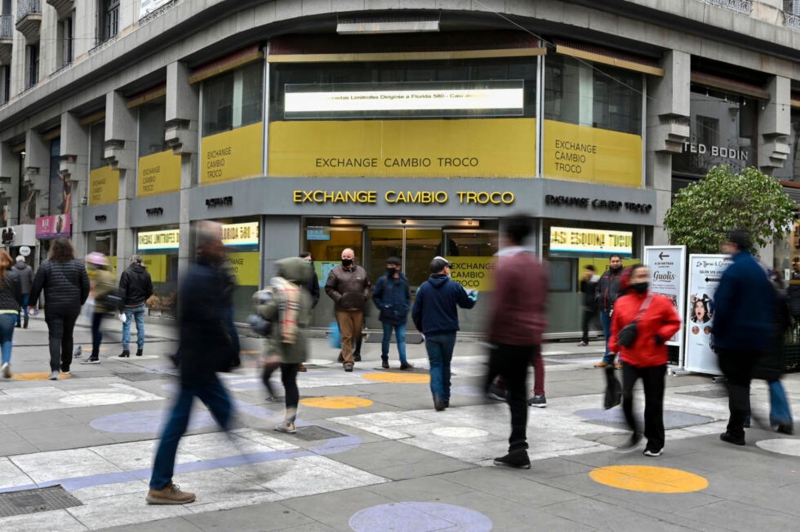
Unable to procure the required amount of foreign currency, businesses had no choice but to buy dollars in “cuevas” in order to protect their proceeds against immediate devaluation. This setup favored remote workers with foreign currency earnings, along with foreign tourists, who significantly increased their purchasing power by exchanging dollars and euros on the black market. It was for this reason that Russian migrants who arrived in 2022 and 2023 found Argentina so “cheap.”
Milei changed the rules, pushing the peso inflation down to 118% by the end of 2024. Meanwhile, as prices began to rise in dollar terms, today's difference between the official and informal exchange rate stands at only 5-6%. Milei's right-wing government lifted most of the Cepo restrictions in April 2025. Real-life consequences aside, Milei has fulfilled many of his election promises: he reduced inflation, canceled Cepo, and adjusted the exchange rate of the national currency against the dollar.
In Argentina, the renewal of parliament is a gradual process. Although Milei’s party took first place in the Buenos Aires city legislature elections, the majority still belongs to the moderate left. The parliament has a total of 60 seats: 20 are held by the moderate left, and 13 by the libertarians (an increase from the previous eight).
Milei slowed down inflation in pesos, but prices began to rise in dollars
“The dollar exchange rate appears ‘tranquilized,’” Dellatorre explains, “but the lull is temporary. The root causes of the shortage of currency and the flight of capital persist. The dollar exchange rate could spike at any moment. While the lull is favorable to the government, we owe it to several factors that the authorities do not control in the long run. Right now, the Argentine economy is receiving additional dollars thanks to the growth of soybean, corn, and wheat exports.”
The Milei government has introduced a temporary tax relief scheme for agricultural exporters until mid-summer 2025: from 33% to 26% on soybeans and from 12% to 9.5% on wheat and corn. As a result, the producers are trying to sell as much as they can. And the libertarian has also decided to do something he swore he would never do.
“I am the only person who can stand the test of the archives,” Milei used to say before becoming president. He took pride in never going back on his words or changing his stance. However, in the 18 months of his presidency, Milei has shown that he is in fact capable of turning on a dime when it suits him — including on economic matters.
In 2022, before becoming president, Milei called the International Monetary Fund a “perverted institution” that “should not exist.” Argentina, which has borrowed from the IMF 23 times since 1958, has a highly toxic relationship with the fund.
Slogans like “No to IMF!”, “IMF get out!”, and “IMF never again” pepper Argentine fences and facades. They are also a frequent sight at protests. Buenos Aires took out the largest ever loan from the IMF — $44.5 billion — under the moderate right-wing government of Mauricio Macri (2015-2019), becoming the fund’s largest debtor, responsible for one-third of all the money currently lent.
In Argentina, the renewal of parliament is a gradual process. Although Milei’s party took first place in the Buenos Aires city legislature elections, the majority still belongs to the moderate left. The parliament has a total of 60 seats: 20 are held by the moderate left, and 13 by the libertarians (an increase from the previous eight).
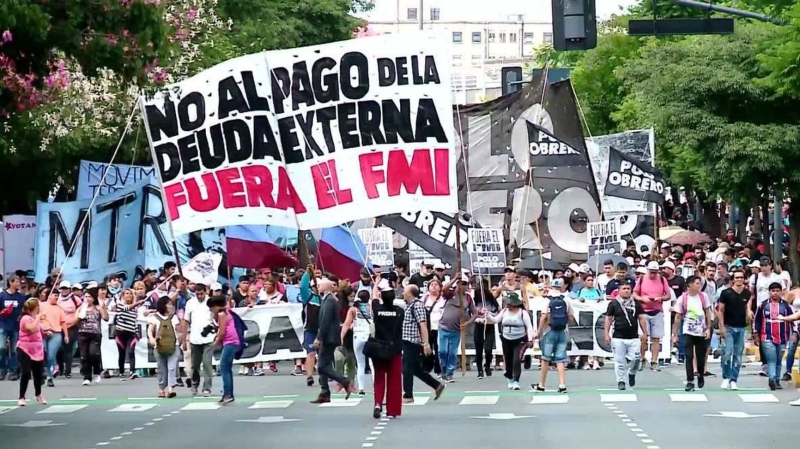
At the time, Milei vehemently criticized Macri's government. “Public debt is immoral. It implies that the public spending 'feast' is covered by generations that not only haven't voted yet but haven't even been born. This is how the present generation steals from future generations. Therefore, a government that goes into debt cannot be liberal,” Milei wrote in 2019. Luis Caputo, Macri's finance minister and head of the Central Bank, also had his share of criticism. Milei described Caputo's economic policy as a “fiasco” and openly welcomed Caputo's resignation.
“The most unscrupulous politician — populist, savage, and liar — is the one who borrows,” President Milei said in March 2025. But less than a month later, his government borrowed $20 billion from the IMF at 5.63%. The first four years are concessional. Buenos Aires will have to repay the loan money between 2030 and 2039. Even if we assume that Milei will be re-elected in 2027 for his second and final four-year term, his term in office will expire in 2031. And the debt will be passed on to the next government — and “future generations.”
In Argentina, the renewal of parliament is a gradual process. Although Milei’s party took first place in the Buenos Aires city legislature elections, the majority still belongs to the moderate left. The parliament has a total of 60 seats: 20 are held by the moderate left, and 13 by the libertarians (an increase from the previous eight).
“The most unscrupulous politician — populist, savage, and liar — is the one who borrows,” President Milei said, only to borrow $20 billion from the IMF less than a month later
According to the Argentine president, this time is “different” and the current IMF loan program is “unprecedented” because it is aimed not at macroeconomic ordering, but at supporting Milei's own robust economic plan. The loan will be used to increase the Central Bank's reserves and to pay debts, including debts to the IMF under the old agreements. Curiously, the Milei government's Ministry of Economy has been run by none other than Luis Caputo, whom Milei now extolls as “the best minister of economy in Argentine history.” In an interview, the libertarian promised to “cut off the hand” of anyone who would doubt Caputo's progress or call for his resignation.
In Argentina, the renewal of parliament is a gradual process. Although Milei’s party took first place in the Buenos Aires city legislature elections, the majority still belongs to the moderate left. The parliament has a total of 60 seats: 20 are held by the moderate left, and 13 by the libertarians (an increase from the previous eight).

“The external debt situation is dire and will likely worsen in 2027–2028,” Dellatorre warns. “Why? Because that’s when the repayment deadlines for long-standing loans — previously deferred by the former administration — will finally come due. The same applies to commitments with international financial institutions. What condition will Argentina be in by then? The country faces enormous debts, and the national economy is in no shape to meet those obligations. A recent IMF disbursement has delayed a default, but only temporarily. The year 2027 also marks the next presidential election. Whoever wins will inherit a debt crisis of critical proportions. That’s why the current opposition is already preparing to challenge the legality of Milei’s IMF agreement in the future, despite its approval by Argentina's Congress. If that challenge fails and Argentina cannot make its payments, the country will be destined for default.”
However, the most important thing for Javier Milei right now is to extend the temporary economic “lull” until October, when Argentina is set to hold parliamentary elections that will see half of the lower house and one-third of the upper house face a vote. In the current parliament, the presidential party, La Libertad Avanza, is in a minority, with 40 out of 257 deputies and six out of 72 senators. In October, the libertarians intend to win and gain control of Congress.
They expect to capitalize on the severe intra-party crisis faced by the country's two largest political forces. The moderate right-wing PRO party (in power from 2015 to 2019) lost two well-liked politicians at once: National Security Minister Patricia Bullrich joined the presidential La Libertad Avanza party, and former Buenos Aires mayor Horacio Rodríguez Larreta is running in the capital's parliamentary elections as an independent candidate.
Things are no better for the center-left coalition Union por la Patria (Union for the Homeland), led by former president Cristina Kirchner (2007-2015). Despite endless scandals and corruption trials, Kirchner is reluctant to hand over the initiative to a younger generation of party members. One such probable candidate would be Axel Kicillof, the popular, recently re-elected governor of Buenos Aires Province, the country's most densely populated region.
In Argentina, the renewal of parliament is a gradual process. Although Milei’s party took first place in the Buenos Aires city legislature elections, the majority still belongs to the moderate left. The parliament has a total of 60 seats: 20 are held by the moderate left, and 13 by the libertarians (an increase from the previous eight).
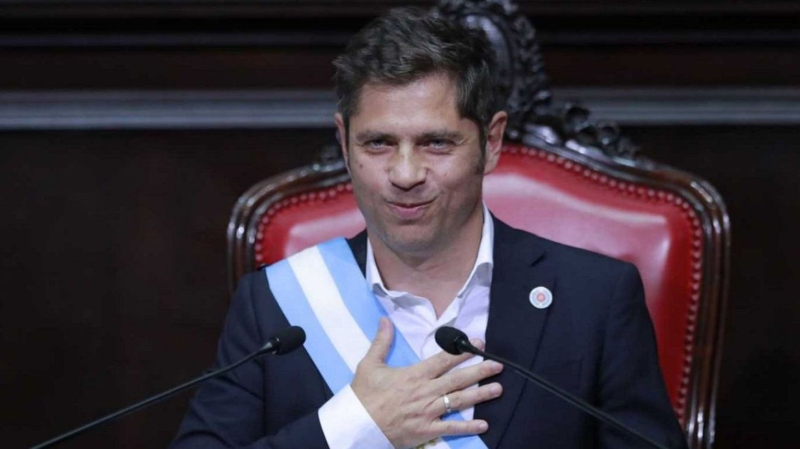
Opinion polls record a decline in Milei's popularity, and dissatisfaction with his government's policies stands at 61%. But experts agree that neither the moderate right nor the moderate left are currently in a position to field an opponent who can compete with the president. In addition to the growing popularity of far-right ideas globally, a major factor in Milei's victory in the 2023 presidential election was the nation's disillusionment with the two principal parties, which ruled in succession from 2015 to 2023 and failed to improve the country's economic situation. Today, they cannot offer voters any new faces or proposals. It was this frustration and the demand for change that allowed the La Libertad Avanza candidate to win with 57% of the vote in the second round.
Milei's government has also prudently postponed the next major blow to Argentines' wallets — a massive cut in state subsidies for light and gas — until after October's parliamentary elections.
Milei is not lying when he calls himself the only presidential candidate who came to power promising budget cuts. The libertarian even employed a tangible symbol for the cuts — his famous chainsaw, which he liked to show off at rallies. But there’s a catch. Milei promised that these cuts would be as painless as possible for ordinary Argentinians, and that the “caste” would be the ones to pay the price. This term, as used by Milei, has a broad meaning, but it primarily refers to professional politicians and government officials who, he claims, have been living as parasites on the Argentine body politic for decades. In reality, not a single Argentine was spared the consequences of ubiquitous price increases, and the ones to suffer the most had no relation with the “caste.”
In Argentina, the renewal of parliament is a gradual process. Although Milei’s party took first place in the Buenos Aires city legislature elections, the majority still belongs to the moderate left. The parliament has a total of 60 seats: 20 are held by the moderate left, and 13 by the libertarians (an increase from the previous eight).
Milei promised to make public spending cuts as painless as possible for ordinary Argentines, but they have been the ones to suffer the most
According to the latest study by the Buenos Aires City Institute of Statistics and Census (IDECBA), in order to be considered above the poverty line in the Argentine capital, a family of two working adults and two children needs at least $1,550 per month — not including rent. Argentina's minimum wage in May 2025 is $267, and in the first year of Milei's presidency, that sum lost one-third of its real value.
“Ten million people have risen above the poverty line,” Milei declared proudly in March during the opening of the parliamentary session, commenting on the achievements of his government. If true, it would represent an impressive figure for a country with a population of 47 million. However, no credible study has verified the optimistic reports of the libertarian president, and experts have dismissed his claims as “misleading.” The real situation with poverty is examined in detail in a study by the reputable Pontifical Catholic University of Argentina (Universidad Católica Argentina, UCA).
According to the actual statistics, in the first months of 2024 negative indicators reached a historic peak due to a sharp surge in prices that pushed nearly 55% of Argentines below the poverty line and 20% into extreme poverty. By late 2024, the poverty rate had fallen back to 38.3% (comparable to 2023 levels), and the percentage of those living in extreme poverty dropped to 9.2% (compared to 8.9% before Milei). UCA findings suggest that persistent poverty affects 30–35% of the population — a figure most of Milleai’s predecessors also failed to appreciably reduce.
In modern Argentina, every third worker is unable to meet their basic needs. Up to 50% of the employed population works in the “informal sector” — temporary jobs without any guarantees or protections — and are often paid under the table. Among Argentinians under the age of 29, up to 60% find themselves in this precarious form of employment. Researchers at UCA have concluded that the actions of the libertarian government over the past 18 months have significantly impeded access to quality nutrition, healthcare, education, housing, decent employment, and personal safety for a large share of the population.
In Argentina, the renewal of parliament is a gradual process. Although Milei’s party took first place in the Buenos Aires city legislature elections, the majority still belongs to the moderate left. The parliament has a total of 60 seats: 20 are held by the moderate left, and 13 by the libertarians (an increase from the previous eight).
Among Argentinians under the age of 29, up to 60% are in precarious employment
In Buenos Aires, a city with just over 3 million residents, the number of homeless people has increased significantly since the end of 2023, especially in the central areas of the city. According to the local government, the number of homeless individuals has grown by 25% over the past year. Official statistics now report more than 4,000 homeless people in the Argentine capital.
And yet, charitable organizations estimate figures that are several times higher than official statistics. Horacio Ávila from Proyecto 7 stated at the end of 2024 that Buenos Aires had some 12,000 homeless people. To compile this data, over 700 volunteers spent four days and nights canvassing every neighborhood of the city. Ávila also highlighted that the composition of the homeless population has changed significantly during Milei’s presidency: “There are more families now. They ended up on the streets with all their belongings and furniture. We’re seeing more mothers with children, and a noticeable increase in elderly people. Many are forced to choose between paying for shelter, buying food, or getting medicine.”
In Argentina, the renewal of parliament is a gradual process. Although Milei’s party took first place in the Buenos Aires city legislature elections, the majority still belongs to the moderate left. The parliament has a total of 60 seats: 20 are held by the moderate left, and 13 by the libertarians (an increase from the previous eight).
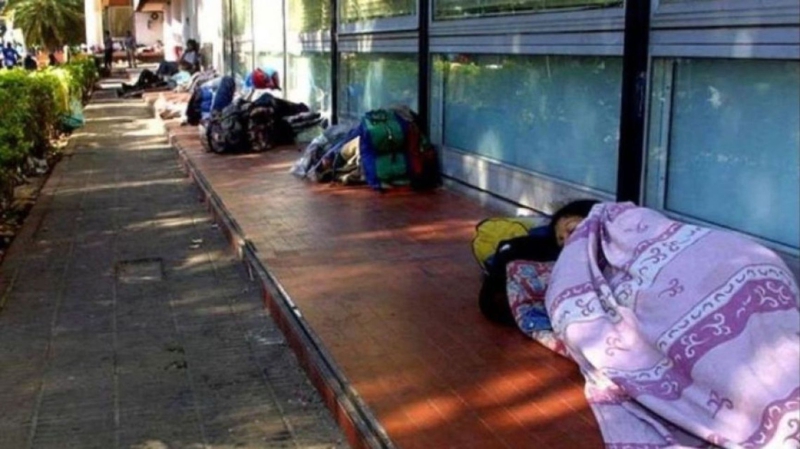
In Argentina, women can retire at age 60 and men at 65, provided they have contributed to the pension fund for at least 30 years. However, statistics show that by retirement age, only 10% of women and 30% of men meet this requirement. Previous governments allowed people to retire after 25 years of contributions, but the libertarian administration has abolished this practice. As a result, thousands of elderly people are unable to work full-time due to health issues — but they may never receive a pension. To further reduce government spending, the libertarian government also plans to raise the retirement age to 70. In any case, the minimum pension in today's Argentina is $308, which puts up to one-third of retirees below the poverty line, depending on where they live.
There is an announcement heard almost every Wednesday on the Buenos Aires subway: “Trains on Line A are skipping the 'Congreso' station due to an ongoing police operation in the area.” Not coincidentally, it is on Wednesdays that pensioners gather to protest outside Congress. They are often joined by members of trade unions, charitable and political organizations, and even football fan clubs.
In Argentina, the renewal of parliament is a gradual process. Although Milei’s party took first place in the Buenos Aires city legislature elections, the majority still belongs to the moderate left. The parliament has a total of 60 seats: 20 are held by the moderate left, and 13 by the libertarians (an increase from the previous eight).
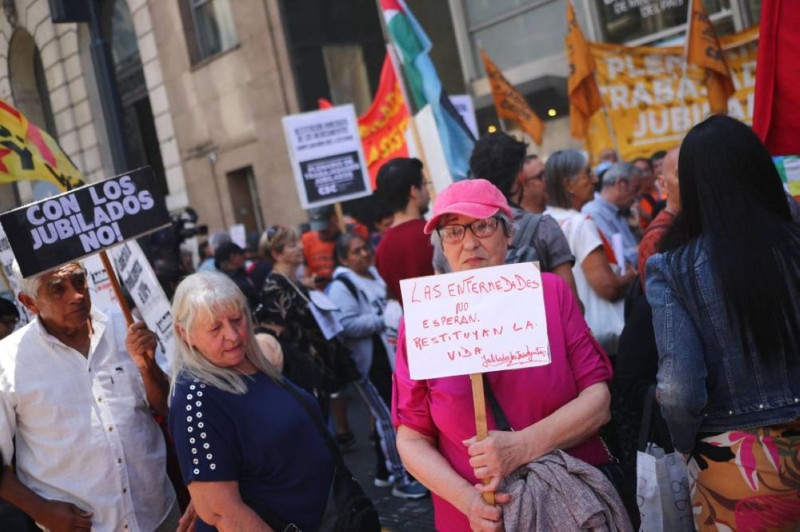
The protests do indeed often end in clashes with the police. “I haven't seen this level of police brutality since the early 2000s. Bullrich already headed the Ministry of Security under Macri (2015–2019), but nothing like this happened back then. It's gotten much worse,” social activist and regular protest participant Carlos Fernández Kostjuk told The Insider. (By referring to the early 2000s, Carlos primarily means December 2001, when 39 people were killed and more than 500 were injured in clashes with the police amid a devastating economic crisis. Since then, the authorities have spared no effort to ensure that mass protests — business as usual in Argentina — remain as peaceful as possible.)
Under Milei, everything is different. He and his Minister of National Security, Patricia Bullrich, who in the 1970s was a member of an ultra-left guerrilla underground group, consider protesters against their government to be criminals by definition.
“The police use excessive force against those exercising their right to peaceful protest, violating key UN standards on the use of force and firearms by law enforcement officers. We have observed the excessive use of tear gas, rubber bullets, and batons by officers of the Argentine National Police, the National Gendarmerie, the Argentine Naval Prefecture, as well as the Buenos Aires City Police. So far, 1,155 people have been injured as a result of these actions during protests,” Amnesty International wrote in its 2024 annual report, providing video evidence.
On May 7, a well-known priest and defender of the poor, Father “Paco” Oliveira, was injured at a protest outside the Congress in Buenos Aires. The priest had his head smashed by a policeman as he was helping an elderly woman get back on her feet.
Milei has a difficult relationship with the press. In the past, the chainsaw-wielding libertarian often appeared on air as an eccentric freak who could turn a conversation about the economy into a show. However, as a leader, Milei cannot tolerate even the slightest criticism. The president gives interviews only to loyal media outlets and answers only complimentary questions.
The president demands the dismissal — or even the arrest — of journalists from the country’s largest newspaper, Clarín, and the America 24 TV channel, if they make even the slightest criticism regarding the libertarian government’s policies. These outlets are not independent or opposition media — they actively supported the right-wing candidate during his 2023 presidential campaign. “Political journalism as a profession must disappear,” said Economy Minister Caputo. In the annual World Press Freedom Index put out by Reporters Without Borders (RSF), Milei's Argentina fell nearly 50 positions: from 40th place in 2023 to 87th in 2025.
Milei hates Argentine cinema mainly due to the fact that the country’s most celebrated filmmakers and actors tend to hold opposing political views. The libertarian president declared that he would not invest money in films “that nobody watches.” Milei ignores the fact that Argentine films have twice won the Oscar (in 1986 and 2010) and have received numerous awards at various international film festivals. In 2024 and 2025, the National Institute of Cinema and Audiovisual Arts (INCAA) did not allocate a single grant. This year, Argentina had no films to present at the Cannes Film Festival — because none were produced.
In Argentina, the renewal of parliament is a gradual process. Although Milei’s party took first place in the Buenos Aires city legislature elections, the majority still belongs to the moderate left. The parliament has a total of 60 seats: 20 are held by the moderate left, and 13 by the libertarians (an increase from the previous eight).
Milei refused to support cinema, and Argentina had no films to present at this year's Cannes Film Festival
“INCAA used to sponsor the production of low- and medium-budget films, offering directors a chance to release their first movie. These investments fostered the development of skilled industry professionals. Masterpieces don’t appear out of nowhere. Now everything has been put on hold. Only large streaming services have been able to carry on with productions. Many professionals are out of their job. According to the 1994 law, the INCAA fund is replenished by a special tax on cinema tickets and TV advertising. But even though the law remains in force and the money is being levied, the government chooses not to use it. There are no economic reasons for this,” Argentine director Benjamín Naishtat told The Insider.
Before the libertarians came to power, 0.3% of Argentina's GDP went to scientific research. The current level is 0.15%, the lowest point since the 2001 economic crisis. The media warn about a “brain drain,” narrating the stories of Argentine scientists who are leaving the country because of Milei's policies. National universities (including the University of Buenos Aires (UBA), the world's 71st best university) had their budgets cut by one-third. Meanwhile, the purchasing power of faculty salaries dropped by 23%.
Large public hospitals, including children's hospitals, are experiencing comparable funding cuts. The Insider spoke with Adriana Gonzalez, a psychoeducator with over 30 years of experience who works at Hospital Garrahan — Argentina's largest pediatric hospital and one of the best facilities of its type in Latin America. Securing employment at Garrahan has always been very difficult and prestigious. However, according to Gonzalez, some of her colleagues are quitting voluntarily, choosing to emigrate or work for pharmaceutical corporations.
“Our salaries no longer cover the consumer basket for a family. Working 42 hours a week, I earn less than 1.5 million pesos per month (around $1,300). Specialists like neurosurgeons make a bit more — about $1,740. Lab technicians and nurses earn $780. No one is hired to replace those retiring. Staff numbers are shrinking while patient numbers are growing,” says Adriana Gonzalez. According to Gonzalez, the cuts have hit research programs the hardest, halting all new studies and training for young and regional specialists. Since its founding in 1987, Hospital Garrahan has been a hub for training and professional development across the country. Today, the money has run out.
In Argentina, the renewal of parliament is a gradual process. Although Milei’s party took first place in the Buenos Aires city legislature elections, the majority still belongs to the moderate left. The parliament has a total of 60 seats: 20 are held by the moderate left, and 13 by the libertarians (an increase from the previous eight).

